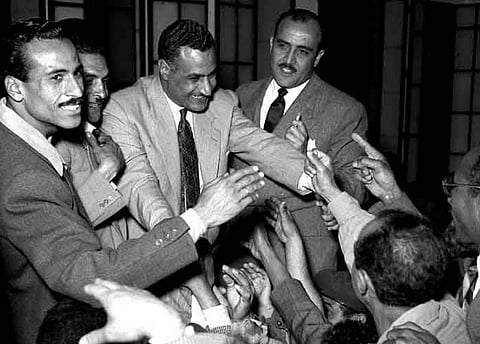

An archivist project by the Gamal Abdel Nasser Heritage Documentation Project and the Bibliotheca Alexandrina in collaboration with the Gamal Abdel Nasser Foundation has recently started releasing tapes recorded by Nasser in the end of his days as President of Egypt.
The content mentioned was unprecedented, and a wide debate has been sparked, both online and within academic circles.
Some argue that Nasser was right, and that he voiced legitimate concerns about the true prospects of Palestinian liberation. Others were shocked, calling him a traitor for speaking so differrently in private as opposed to his public statements in support of Palestine and the PLO.
The audio recording is reportedly from August 1970, shortly after the United States proposed the Rogers Plan. In what appears to be an airport lounge or perhaps a nearby office—evident from the background noise of jet engines—President Gamal Abdel Nasser and Colonel Muammar Gaddafi are engaged in a serious conversation.
The year 1970 was a pivotal moment in the Arab-Israeli conflict. The War of Attrition was still ongoing, and tensions in Palestine and Jordan are near a breaking point.
Their discussion centers on Palestine and the broader Arab struggle.
During the private exchange, Nasser shares his deep frustration with several Arab leaders. He expresses disillusionment with the political elites of Iraq, Syria, Algeria, Southern Yemen, and the Palestine Liberation Organization (PLO), accusing them of espousing empty slogans while offering little meaningful support to the Palestinian cause or the broader Arab struggle.
Nasser cites specific grievances. He recounts how the Algerian president had pledged to supply Egypt with 40 aircraft but ultimately delivered only 16. He also criticizes the Iraqi leadership, claiming their bellicose rhetoric is not grounded in reality. At the time, Iraq’s defense budget stood at 70 million Egyptian pounds, while a single Israeli arms deal that year amounted to 400 million Egyptian pounds—more than four times Iraq’s entire defense allocation.
Nasser is equally critical of the PLO. He believes its leadership is too aggressive and lacks a coherent strategy for governing a post-Hashemite Jordan. In his view, even if the PLO were to take power in Jordan, it would be incapable of managing state affairs effectively, let alone liberating the West Bank through military means.
Nasser also confided in Gaddafi the immense pressures Egypt had been facing since the defeat in the 1967 war. He revealed that Egypt had lost a total of 102 aircraft—both in combat and training operations. He further stated that the acceptable kill ratio between Egyptian and Israeli soldiers had been calculated at ten Egyptians for every one Israeli. This, he emphasized, was not a figure arrived at lightly or with a clear conscience.
Nasser warned that such losses were unsustainable. He had endured them for over four years, but the strain was mounting. He told Gaddafi that Egypt urgently needed manpower—specifically, trained fighters and pilots. While the Soviet Union eventually responded by dispatching a detachment of MiG pilots at his request, he expressed frustration that Algeria, despite its promises, refused to send any of its own fighter pilots. The implication was clear: Arab states were unwilling to make real sacrifices, instead leaving Egypt to bear the brunt of the conflict alone.
Nasser also criticized some of the rhetoric coming from Arab states that were either geographically removed from the frontlines or militarily incapable of contributing in a meaningful way.
He denounced the popular call to “liberate Palestine from the river to the sea” as both unrealistic and reckless, one of the quotes that has sparked the most controversy online.
He argued that such maximalist slogans had contributed to the disastrous outcome of the 1948 war, following the failed negotiations of 1947. The result, he said, was that Israel not only secured a decisive victory but also expelled large numbers of Palestinian inhabitants and began a systematic process of Judaizing the territory.
In his view, a similar approach today could lead to even more catastrophic outcomes—potentially resulting in the complete displacement of Palestinians from the already-contested territories lost in 1967.
Instead, Nasser advocated for a phased struggle: First reclaiming the 1967 lands, then addressing the 1948 territories, and eventually working toward a one-state solution by any viable means. Such a gradual, strategic approach, he believed, was far more feasible for the Arab world than slogans and symbolic wars.
Nasser died a month after this recording, and while we would never know how he would have acted if he continued with his rule, these recordings give us a vague idea.
When Mubarak and Sadat were telling the public they were working within the mandates and promises of Nasser - they were met with ridicule and disbelief, but, with such new recordings, these claims must be taken seriously, or at least not dismissed at face value.